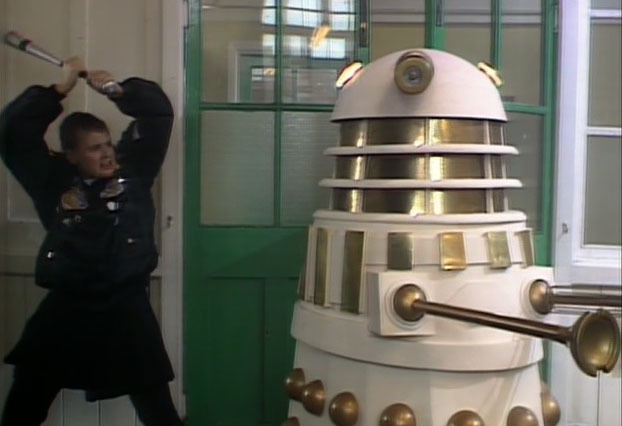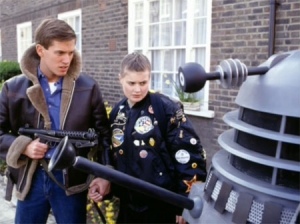
Good Lord, I had forgotten how good this story was. This is an action packed 4 part story complete with comedy moments, high stakes and emotional beats. I’ve always loved this era of the show and this story does it so well. Sure, Silver Nemesis was the official 25th anniversary story, but this one does everything you could wish for from an anniversary special without overdoing it. In some ways, it’s on a par with Day of the Doctor, in other ways it trumps that huge, overblown celebration episode.
One of the notable things this era of Doctor Who does so well is upping the pace of the stories, and part of how it does this is by making the Doctor “in the know”. Yes, this links with the grand plot of the arch cosmic manipulator that is the topic of much controversy, but as a story telling device it manages to overcome some of the classic problems of the show: the standard plot line of the classic era had the the TARDIS crew arriving somewhere, not knowing where they were, assuming everything was well and gradually, over the first episode, they would stumble into crisis: it worked, it allowed gradual character work and suspense as we wondered what was going to happen. But it made for a slow first episode. Here, the Doctor is in the action from the start, because he already knows what’s going on, he has purpose and direction from the word go. He is so much more of an active participant in the story as well, again losing that trope of the Doctor being someone to whom things happen. And he says the reason clearly enough: he’s 900 years old – by this point you would expect him to start being a little more in the know.

And the Doctor and Ace just spark so well together. There’s such affection there and a genuine exploration about what it means to travel together in a clearly unequal power dynamic. Ace is teenager, but a capable, brilliant teenager whom he both trusts and tries to protect. We actually get a serious discussion about why he wants her to stay behind at one point and, after her initial objection, she actually agrees to and promises to remain. This is not that trope of the Doctor saying, “stay,” and the companion then dashing off the moment his back’s turned that has turned into such a cliche. This is actually considerately done. And then, when she later does go off, the reasons and motivation are clear: she’s clearly been stuck around for a while, was getting fed up and restless, but might actually have done as she had promised if it wasn’t for that moment when she recognises her host’s racism. “I need a breath of fresh air.”
The political commentary here, again, is well done. It is woven so naturalistically into the story, to the extent that, yes, I don’t believe that I actually realised that was Ace’s motivation for walking out first time I watched it: it’s all there in Sophie’s acting, but it’s not spelt out and overdone. By the end of the story, you could hardly miss the subtext, i.e. the parallels between 20th century racism and fascism and the Daleks, but no one could seriously accuse the story of ramming it down their throat.
The character of Mike is incredibly well done in this context. Because he is more than likeable: there’s nothing on the surface unlikeable about him at all. He is friendly, considerate playful and, indeed, handsome. And you can entirely see why Ace is taken with him. It seems possible that, as he claims, he doesn’t know about the Daleks. This is no power hungry man willing to compromise his principles for power and willing to betray the human race due to some ill thought out plan. Mike is a family man, loyal to his friends. True, he probably is a little ambitious and little too eager to be part of something world changing, but the show has forgiven that flaw before: he shares a name with earlier flawed but likeable soldier, Mike Yates. I suspect it is not a coincidence. However, the show ultimately forgives and redeems Yates. What condemns the Mike of this story, what clearly leads him to be a position where he allied himself with less than desirable types, is his racism. And such an underplayed, ‘reasonable’ racism. But, under all of that charm, he turns out to be a Neo Nazi. And that is so well done. In fact, his character arc could almost be used in modern Prevent training showing the dangers of radicalisation.

So, where are the weaknesses?
It would be fair to say that, in keeping the story fast paced, Remembrance has seemingly pushed a lot of stuff off screen, and that includes a lot of character moments. Not all of them, absolutely: this era of the show is dedicated to showing Ace’s character development. But when it comes to most of the other characters and some of the plot, Remembrance does take a few liberties. On the whole, they work. We do get the impression that a fair amount of discussion and work goes on with Gilmore and Jenson and the Doctor off screen, and we don’t really need that explicitly shown on screen. The story also ‘magically’ jumps over seemingly important moments. For example, early in episode 1, Jenson accepts the Doctor’s help remarkably quickly and with no real explanation and is very soon vouching for him to Gilmore. For realism, one would probably want a slightly more credulous Jenson, but, it works: we shortcut the tedious back and forthing “who are you? Why are you here? Arrest him! Oh, wait, you’re useful.” We get the same result (army onside with the Doctor) but quicker. It’s essentially the effect that RTD was going for when he introduced the psychic paper. So, let’s just assume that the Doctor has some magical mind game powers that mean that people tend to accept him. But occasionally, I find myself wishing they had spent a little longer on certain aspects. Rachel Jenson and Allison were great character, I just wish they had got a little more screw time. And, as much as one can follow the relationship arc between Mike and Ace, I think her vehement anger at his betrayal would have been more hard hitting had more of their relationship been on screen.
For all that, though, I hardly feel it dents what proves to be a fantastic story. The way it tries to create a much stronger, unified narrative in the canon, by calling back to the 1st Doctor’s time on Earth and suggesting that, even then, he was involved in something bigger than we believed works well. (And, yes, is very similar to what both Moffat and Chibnal have done in recent years). We also have the delightfully creepy girl and a gorgeously overblown performance from Malloy as Davros that leads in to one of the most enjoyable Speeches from the Doctor in the entire canon. True, it isn’t as ‘powerful’ as many of the Moffat era ones, nor is it even as heartfelt and true as some McCoy’s own, but it is an anti-speech, it the Doctor demonstrating his contempt for rhetoric, and I love it.

I have always maintained that this era of the show is one of the strongest in the canon, and coming back to it for this, I am delighted to find it has yet to disappoint.
Next stop, The Happin
